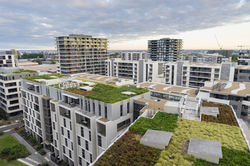GREEN TECHNOLOGY IN SABAH
The Sabah government is committed to optimising use of green technology which is capable of assisting society in the context of human development in the dimensions of socio-economy and environment in future.
Sabah Government Committed to Green Technology
The Sabah government is committed to optimising use of green technology which is capable of assisting society in the context of human development in the dimensions of socio-economy and environment in future.
The launching of the Malaysian Green Foundation or Yayasan Hijau Malaysia (YaHijau) and the ‘MyGreen Sabah” Sabah programme in 2014 marked a good beginning that can be capitalised by all layers of society, the business community and industry players in Sabah to better understand the importance on the use of green technology and practise a “green” lifestyle.
About 2 million sq ft of land in Sabah has been declared under Green Building Index (GBI) that indicates sustainability in construction and building development to provide energy savings, water savings, adoption of recycling and greenery.
Since 2009, the ministry has implemented various programmes to promote green living and green technology. Among the initiatives are providing incentives or investment tax allowance on the purchase of green technology equipments and exemption from income tax on the use of green technology service and system.
These initiatives have opened so many opportunities to attract more private sectors involvement in the development of programmes related to green technology such as MyHIJAU, green technology financing scheme and Government Green Procurement (GGP).
Sabah Chief Minister, Musa Aman said the state government had set up the Sabah Green Technology and Climate Change Committee which was responsible for formulating policies and making recommendations on tackling green technology issues and climate change at the state level.
The committee would complement the efforts of the federal government’s Green Technology and Climate Change Council chaired by Prime Minister Najib Tun
Razak, he said, adding that the state had achieved notable successes like the Sabah Art Gallery Building being awarded the Green Building Index certificate.
Apart from this, he said three hotels in Sabah – Shangri-La’s Tanjung Aru Resort and Spa, Kota Kinabalu; Shangri-La’s Rasa Ria Resort, Tuaran and Nexus Resort Karambunai, Kota Kinabalu – won Asean Green Hotel 2014 awards in conjunction with the Asean Tourism Forum 2014.
 |
|---|
 |
Green Building in Sabah
In the past decade, communities around the world have embraced green building certification as a way to recognise and encourage sustainable construction by setting standards for whole-building energy efficiency, water conservation, materials and waste management, interior air quality and other innovative features that reduce environmental impacts and create healthier spaces. They also drive the construction industry to raise the bar on sustainable performance.
In Sabah, the implementation of green building guidelines has been put forward by the Kota Kinabalu City Hall (DBKK).
Starting August 2017, DBKK will require all new building plan submissions here to incorporate energy efficient Overall Transfer Thermal Value (OTTV) and Roof Insulation codes.
For this purpose, Mayor Datuk Yeo Boon Hai has requested the Malaysian Green Building Confederation (MGBC) to formulate guidelines to be adopted by the building industry for both residential and non-residential buildings.
“Sustainable development is one of the most debated topics in the built environment industry. It is because the industry is responsible for 30 percent of the global greenhouse gas emission (GHG),” said Yeo, adding that air conditioning contributed a substantial 60 percent of energy consumption in Malaysian office buildings.
This shows that there will be a surge of opportunities and demands within the supplies for green building products and services in Sabah in the months and years to come. Such opportunities pave way for local companies to be involved in the supplies and services sector.
REGTech2017 is an excellent platform for manufacturers, suppliers and distributors, facility and asset managers, developers, contractors, utilities, service providers and others related to the green building industry to develop partnerships, exchange ideas and network.
Green Technology Outlook in Sabah
There are already a wide variety of projects and plans from various sectors that are prioritising green technologies. In the real estate market, Sabah Housing and Real Estate Developers Association (SHAREDA) is keen to incorporate green technology into residential buildings with solar power cells and special designs for ventilation and insulation.
The Palm Oil Industrial Cluster (POIC) in Lahad Datu is encouraging investors to bring their best available clean technologies, those categorised by the Malaysian Department of Environment as a special industry.
The Sabah government recognises that the value of natural resources can be maximised through sustainable exploitation. Green awareness is growing among industrialists.
Sources:
http://www.freemalaysiatoday.com/category/nation/2014/03/02/sabah-govt-committed-to-green-technology/
<http://www.theborneopost.com/2017/02/19/new-buildings-required-to-meet-green-building-requirements/>

